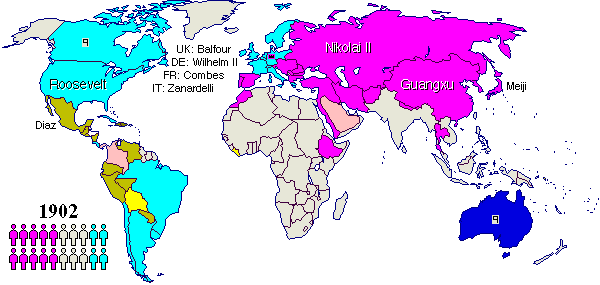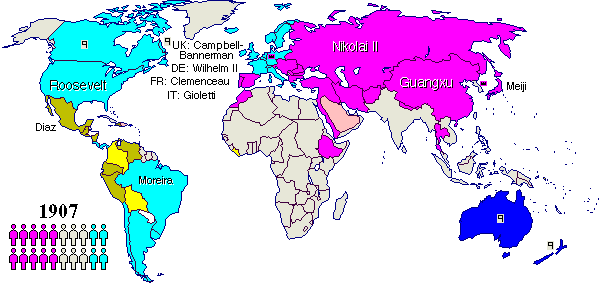


![]()
![]()
When the Twentieth Century began, monarchy was the default setting for any new government setting itself up in the Eastern Hemisphere. Greece chose a king shortly after achieving its independence in 1829; as did Belgium in 1831. This tradition continued even into the first decades of the new century. When Norway broke from Sweden in 1908, it became a monarchy; so did Albania when it broke from Turkey in 1913.
Because the kings of Europe were often cousins to one another, this web of monarchies linked all the great nations of Christendom together in bonds of kinship. And because most of the world was run from Europe, there was a strong sense of unity across the globe. In fact, the overriding political trend of the previous century had been a vast reduction in the number of sovereign states. They had either joined into larger nation-states like Italy or Germany, or they had been conquered by the imperialist powers. Except in the wilds of central Arabia where nomadic tribes still roamed, there was no place in the entire inhabited world that had escaped being incorporated into one centralized empire or another -- at least on the maps.
In the Western Hemisphere, it was a different story altogether. Here, nations proliferated. The English, French and Portuguese colonies had each spawned one new nation apiece, while the old Spanish Empire had shattered into 15 different nations. Except for the short careers of a couple of "emperors" in the early days, none of the new nations of America had chosen to become monarchies. Instead, most established democratic constitutions, and a few even tried to abide by them. The rest, however, were run by informal and kaleidoscopic coalitions of landowners, church fathers and military strongmen. Transitions of power were made by coup d'etat and assassination, and periodic peasant revolts swept across the land.
No one at the time knew it, but this was to be the wave of the future.
![]()
Last updated March 2000
Copyright © 1998-2000 Matthew White